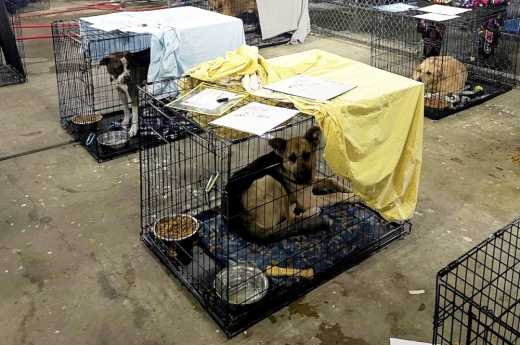Diving in
The report found the shelter:
- Failed to hit the goal caring for 16,000 animals each year
- Utilized crates or cages intended for short-term use for long-term housing
- Kept animals in conditions where they did not have adequate room to stretch out, separate themselves from playmates if desired, and avoid having to sleep near food and waste
- Failed to keep facilities clean, such as having algae in outdoor areas
- Lacked other adequate outdoor safety features
- Has an outdoor play yard that reached 176 degrees Fahrenheit during one site visit
- Often restricted or closed animal intake
- Failed to provide data regarding the shelter’s progress often
The conditions
The report found several reasons the shelter struggled to meet all of its goals:
- Prioritizing the no-kill threshold—a City Council mandate that 95% of animals should leave the shelter alive
- Poor relationships between management and other stakeholders
- Less support from animal rescue organizations, including fewer animals being taken in by Austin Pets Alive
The audit laid out a number of steps for the Interim City Manager Jesús Garza and Chief Animal Services Officer Don Bland to take, including:
- Rebuilding relationships
- Developing a strategic plan
- Developing a plan to keep the shelter clean
- Periodically reviewing data for accuracy

What they’re saying
Council Member Leslie Pool said the recommendations from the audit are basic tasks Bland should have been handling.
“I am extremely disappointed that we find ourselves in such a fundamental disconnect between the responsibilities of this office and the fact that these are the recommendations coming out of an audit, which means that these responsibilities have not been fulfilled,” Pool said.
She said the audit affirms her lack of trust in Bland.
“I believe that we need increased accountability to ensure that the issues are being effectively addressed. This audit and the results, colleagues, I'm just taken aback by how unacceptable the conditions are,” Council Member Mackenzie Kelly said.
Kelly and Pool both asked for council to be regularly updated on the shelter’s progress.
“We are pleased with the auditors and the depth that they went into. And we look forward to working with the city manager, the council office and the commissioners, and the public to balance our needs and determine what we as a city need to do to go forward,” Bland said.
What’s next
Assistant City Manager Stephanie Hayden-Howard said the shelter is in the process of hiring four employees and is working with a consultant to improve operations.
Pool asked that management look for ways to improve the shelter beyond just asking council for additional funds.
Garza said he supports addressing the root causes of the problem as well as developing a plan to sustain the shelter going forward.





